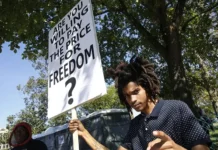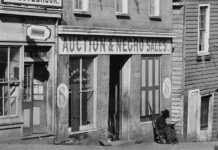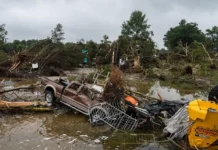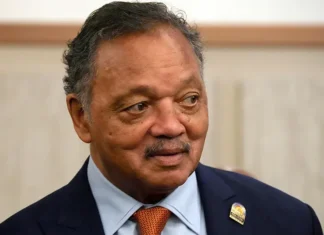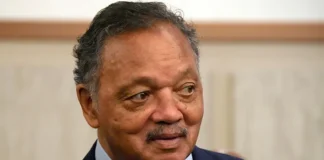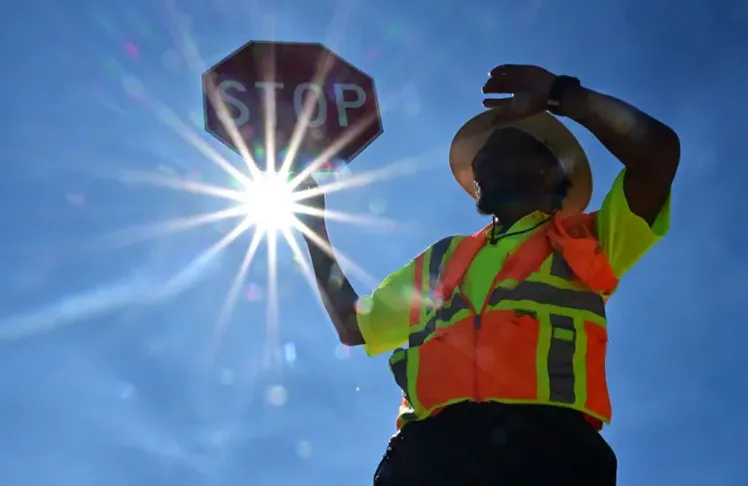
by Mustafa Ali
My old boss, Chairman John Conyers, once told me: “If you want to know whether something is a priority, just look at the funding. If they care, they will fund it.” And in that quiet, piercing truth lies the most damning indictment of our time.
Because when the heat comes — when it really comes, not just in degrees but in suffocation, in stillness, in the way asphalt blisters under bare feet and air turns into punishment — you begin to understand what America values. And who it doesn’t.
Heat is not neutral. It plays favorites, but not by chance. It targets Black and Brown zip codes with surgical precision — slicing through maps drawn long ago by red ink and racist hands. The old HOLC maps from the 1930s weren’t just records of “risk.” They were blueprints for neglect. And those same red lines now burn like brands across bodies that have always carried the weight of this country’s indifference.
Take a walk through any city in August, and you’ll feel the story written on your skin. The formerly redlined neighborhoods are often up to 10–15 degrees hotter than their wealthier, whiter counterparts just a few blocks away. Not because of some meteorological coincidence, but because of what’s missing—trees, parks, shade, breezes, investment. Instead, there’s concrete, glass, and metal absorbing the sun’s wrath like a slow-cooked genocide.
And when that heat rises, it doesn’t just threaten comfort. It steals breath. It induces labor. It triggers strokes. It kills.
Apparently, death is only worth avoiding when it’s inconvenient for the rich.
But we don’t fund cooling centers. We don’t subsidize energy bills for the poor in the middle of a heat emergency. We don’t retrofit aging public housing units with air conditioning. We don’t declare heat a disaster until it’s too late. Because apparently, death is only worth avoiding when it’s inconvenient for the rich.
And don’t think for a second that’s accidental.
When the levees broke in New Orleans, it wasn’t just the water that drowned the Ninth Ward. It was the decades of underfunded infrastructure, the years of policies that said, “you don’t matter enough to protect.” That same story is playing out now — but instead of floods, it’s fire. Fire in the lungs. Fire on the skin. Fire in our social contract, which burns brightest where the promises have always been the most hollow.
We talk about housing like it’s a commodity. Something to be earned. But shelter is survival. Especially when the climate comes calling. And the cruelest part of this heat crisis is that it lands hardest on those whose housing was already weaponized against them — families redlined into heat islands, forced into units that trap warmth like coffins, unable to relocate because the rent in safer zones is a number that only privilege can afford.
If we cared, we’d fund it.
You don’t fund what you don’t fear. And you don’t protect what you don’t love.
We’d spread shade equity across the city like a patchwork quilt, not just drape it over the rich. We’d cool schoolyards where Black and Brown kids faint into the asphalt during recess — bodies limp in places the architects of redlining once marked unworthy of trees or shade.
We’d turn scorched, vacant lots into humming green sanctuaries. Pass housing justice laws that recognize that letting a neighborhood bake in extreme heat is a policy choice — a kind of state-sanctioned violence with a signature at the bottom.
But we don’t. Because you don’t fund what you don’t fear. And you don’t protect what you don’t love.
Policy isn’t just paperwork. It’s poetry — sometimes brutal, always honest, blood-stained verse. The stanzas are written in funding requests approved and denied, in heat maps that glow in zones where old banks drew redlines and said ‘Not here.’ In some neighborhoods, people melt in the heatwave’s grip, in others, developers break ground on luxury units with bejeweled rooftop pools and build shade-lush courtyards of rare plants.
And in this poem, the rhyme scheme is genocide by omission. Each line, a life left to boil in the legacy of neglect. The meter ticks off the years, each family stares at a cracked playground and wonders if summer will take someone they love. When it comes to heat, who gets cooled and who gets cooked is policy. It’s money. And it’s memory — written in the records, drawn in the lines, and felt in the living, breathing heat.
This heat is not just the product of a warming planet.
We say we’re “resilient,” like that’s supposed to be enough. But resilience is what the oppressed say when we know no cavalry is coming.
What we need is a reckoning. Not just with carbon, but with capitalism. Not just with emissions, but with omissions — of care, of compassion, of justice.
Because this heat is not just the product of a warming planet. It’s the child of redlining, of urban planning rooted in apartheid logic, of a nation that drew lines across maps and called it policy, but practiced slow death.
And it is the vulnerable — the elders in high-rises without ventilation, the children in sweat-drenched beds, the unhoused with nowhere to run — who bear the cost.
So the next time someone asks whether heat is a climate issue or a racial justice issue, tell them it’s both. And tell them the question itself betrays a comfort too easily afforded.
The sacrifice zones are growing. And the thermometer is no longer a measure of weather — it’s a measure of will. Of whether we’ll continue to let people bake in forgotten corners, or finally fund the future we claim to believe in.
If we cared, we would fund it.
If we cared, we’d act like every degree matters — because every degree does.
And every life scorched in silence is a policy failure written in ash.
Dr. Mustafa Ali is a poet, thought leader, strategist, policymaker, and activist committed to justice and equity. He is the founder of The Revitalization Strategies, a business focused on moving our most vulnerable communities from “surviving to thriving.” Ali was previously the senior vice president for the Hip Hop Caucus, a national nonprofit and non-partisan organization that connects the hip-hop community to the civic process to build power and create positive change.


